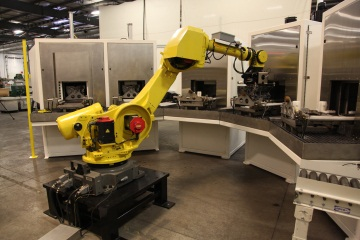 A new, high quality casting impregnation system is providing tangible benefits for a major automobile manufacturer in the USA. The system, from Godfrey & Wing, has been installed as part of a fully automated engine manufacturing line and is capable of impregnating a single aluminum cylinder block in less than 98 seconds.
A new, high quality casting impregnation system is providing tangible benefits for a major automobile manufacturer in the USA. The system, from Godfrey & Wing, has been installed as part of a fully automated engine manufacturing line and is capable of impregnating a single aluminum cylinder block in less than 98 seconds.
Combining efficient cycle times with excellent sealing performance, guaranteed to seal 100% of micro porosity by the supplier, high performance post cleaning, a lower treatment cost per block along with tangible environmental benefits, the ‘Continuous Flow Impregnation’ (CFi) system has raised the bar in the impregnation industry to new levels. In addition, the CFi operates without direct labor, significantly lowering the hours/unit production cost which is so very important to the automotive OEM.
The CFi system takes a single fully machined cylinder block straight from the production line and using a robot, automatically passes it through a four stage vacuum impregnation process. The process components are a Dry Vacuum Pressure (DVP) impregnation chamber using a low viscosity sealant, a centrifuge to recover surplus sealant for re-use, a cold water wash stage to clean the head and a hot water cure stage to solidify the sealant inside the casting porosity.
As a result of this very effective process, impregnated cylinder blocks are impervious to the passage of gas or liquids which could otherwise result in leakage during service leading to engine failure and expensive recalls.
Capable of operating 24 hours a day, 7 days a week across three shifts and producing over 250,000 cylinder blocks per year, the CFi is an integral part of the OEM’s operation.
A feature of the CFi system is the ability to process singular parts such as cylinder heads, blocks, transmission cases or trays of smaller parts such as fuel injection pumps, air conditioning compressors and power steering housings in just a few minutes. This benefits handling and a seamless integration with other manufacturing operations, as well as requiring significantly less floor space than conventional impregnation systems.



